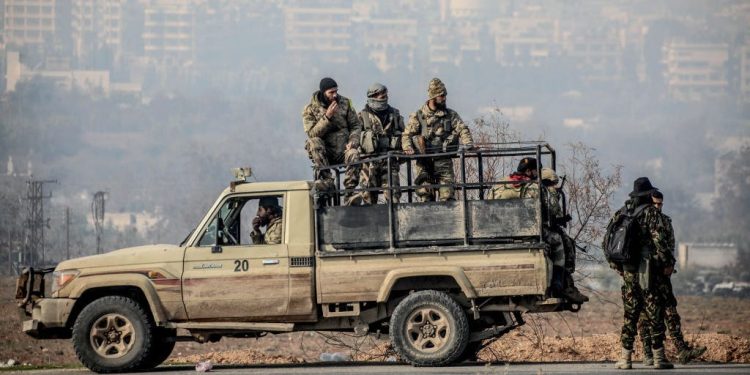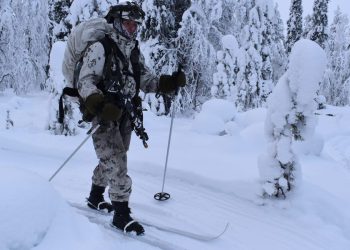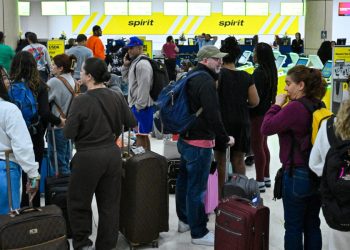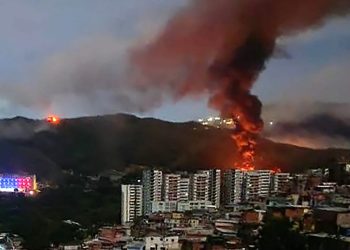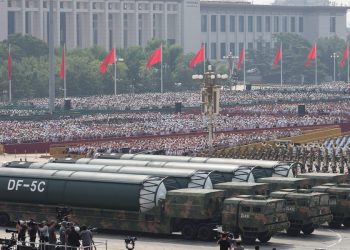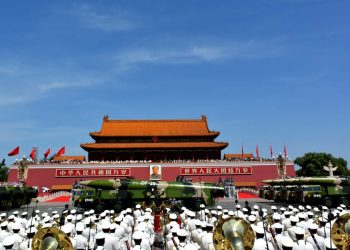- A rebel commander said opposition forces had begun to encircle the Syrian capital, Damascus.
- Damascus is the seat of power for Syrian President Bashar Assad.
- Rebel forces have already seized the key cities of Aleppo and Hama and are advancing on Homs.
Anti-government forces said Saturday they had begun to encircle Damascus, Syria’s capital, threatening President Bashar Assad’s hold on power.
“Our forces have begun implementing the final phase of encircling the capital, Damascus,” rebel commander Hassan Abdul-Ghani said in a post on social media.
Assad’s office said the president continues to work from Damascus, denying rumors he had fled the country.
The rebel march toward the capital is part of a surprise offensive launched by a coalition of opposition forces led by Hayat Tahrir al-Sham, which traces its origins to the Al Qaeda terrorist network.
The offensive, which began in late November, has already seen rebel forces take Aleppo, one of Syria’s largest cities, and Hama. They are also advancing on the strategic city of Homs, which sits at an important crossroads linking Damascus to the coast.
Homs is the last major city on the road south to Damascus, and its fall would effectively cut off the capital from the coastal stronghold of Assad’s Alawite sect.
The potential downfall of Assad’s government could have significant global implications, especially for Russia and Iran, two of Assad’s strongest allies.
For Moscow, which operates two major military facilities in the country — the Hmeimim airbase and the Tartus naval base — Syria offers its forces crucial access to the Mediterranean Sea and a base to launch operations into Africa.
Losing access to these bases would scupper many of Russian President Vladimir Putin’s plans in the region, Zineb Riboua, a research fellow and program manager at the Hudson Institute’s Center for Peace and Security in the Middle East, wrote on X. “Without a strong Russian military base in Syria, all of Putin’s plans collapse.”
While Russia intervened to prop up Assad in 2015, its priorities have since shifted to the war in Ukraine, and it has appeared reluctant to divert any significant resources to help the Syrian president this time around.
The Russian embassy in Syria on Friday advised Russian nationals to leave the country “in the light of the difficult military and political situation” there.
For Iran, Syria is part of an important land corridor stretching from Tehran to Baghdad, Damascus, and Beirut, helping it support key regional proxies such as the Lebanese militant group Hezbollah.
Tehran, too, has been distracted by its conflict with Israel. Hezbollah has been left in disarray after Israel killed its longtime leader and wounded thousands of its fighters with exploding pagers and walkie-talkies.
President-elect Donald Trump weighed in on the situation in a post on Truth Social on Saturday, calling on the United States to stay out of the conflict and saying Russia being forced out of Syria “may actually be the best thing that can happen” to Moscow.
“There was never much of a benefit in Syria for Russia, other than to make Obama look really stupid,” Trump wrote.
He added: “In any event, Syria is a mess, but is not our friend, & THE UNITED STATES SHOULD HAVE NOTHING TO DO WITH IT. THIS IS NOT OUR FIGHT. LET IT PLAY OUT. DO NOT GET INVOLVED!”
- A rebel commander said opposition forces had begun to encircle the Syrian capital, Damascus.
- Damascus is the seat of power for Syrian President Bashar Assad.
- Rebel forces have already seized the key cities of Aleppo and Hama and are advancing on Homs.
Anti-government forces said Saturday they had begun to encircle Damascus, Syria’s capital, threatening President Bashar Assad’s hold on power.
“Our forces have begun implementing the final phase of encircling the capital, Damascus,” rebel commander Hassan Abdul-Ghani said in a post on social media.
Assad’s office said the president continues to work from Damascus, denying rumors he had fled the country.
The rebel march toward the capital is part of a surprise offensive launched by a coalition of opposition forces led by Hayat Tahrir al-Sham, which traces its origins to the Al Qaeda terrorist network.
The offensive, which began in late November, has already seen rebel forces take Aleppo, one of Syria’s largest cities, and Hama. They are also advancing on the strategic city of Homs, which sits at an important crossroads linking Damascus to the coast.
Homs is the last major city on the road south to Damascus, and its fall would effectively cut off the capital from the coastal stronghold of Assad’s Alawite sect.
The potential downfall of Assad’s government could have significant global implications, especially for Russia and Iran, two of Assad’s strongest allies.
For Moscow, which operates two major military facilities in the country — the Hmeimim airbase and the Tartus naval base — Syria offers its forces crucial access to the Mediterranean Sea and a base to launch operations into Africa.
Losing access to these bases would scupper many of Russian President Vladimir Putin’s plans in the region, Zineb Riboua, a research fellow and program manager at the Hudson Institute’s Center for Peace and Security in the Middle East, wrote on X. “Without a strong Russian military base in Syria, all of Putin’s plans collapse.”
While Russia intervened to prop up Assad in 2015, its priorities have since shifted to the war in Ukraine, and it has appeared reluctant to divert any significant resources to help the Syrian president this time around.
The Russian embassy in Syria on Friday advised Russian nationals to leave the country “in the light of the difficult military and political situation” there.
For Iran, Syria is part of an important land corridor stretching from Tehran to Baghdad, Damascus, and Beirut, helping it support key regional proxies such as the Lebanese militant group Hezbollah.
Tehran, too, has been distracted by its conflict with Israel. Hezbollah has been left in disarray after Israel killed its longtime leader and wounded thousands of its fighters with exploding pagers and walkie-talkies.
President-elect Donald Trump weighed in on the situation in a post on Truth Social on Saturday, calling on the United States to stay out of the conflict and saying Russia being forced out of Syria “may actually be the best thing that can happen” to Moscow.
“There was never much of a benefit in Syria for Russia, other than to make Obama look really stupid,” Trump wrote.
He added: “In any event, Syria is a mess, but is not our friend, & THE UNITED STATES SHOULD HAVE NOTHING TO DO WITH IT. THIS IS NOT OUR FIGHT. LET IT PLAY OUT. DO NOT GET INVOLVED!”
